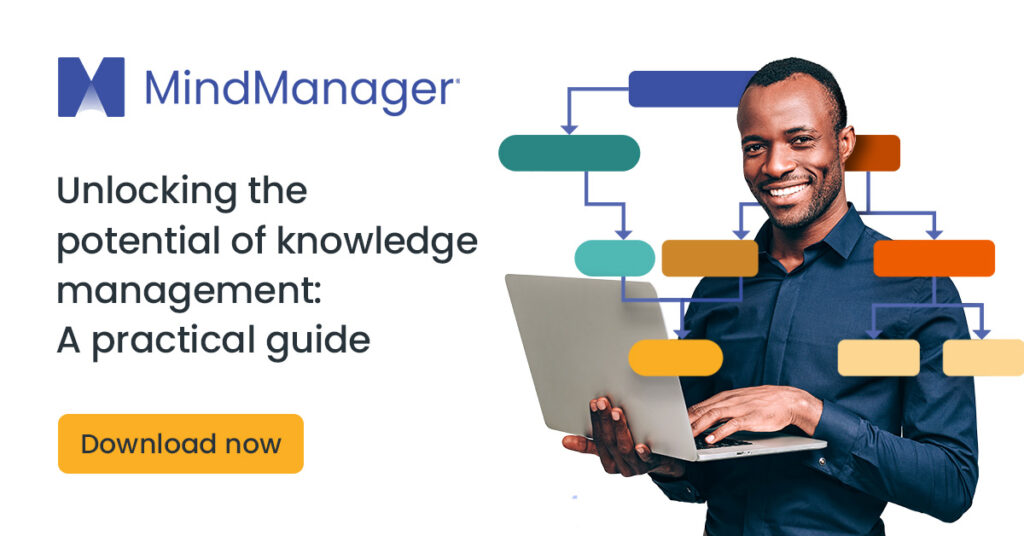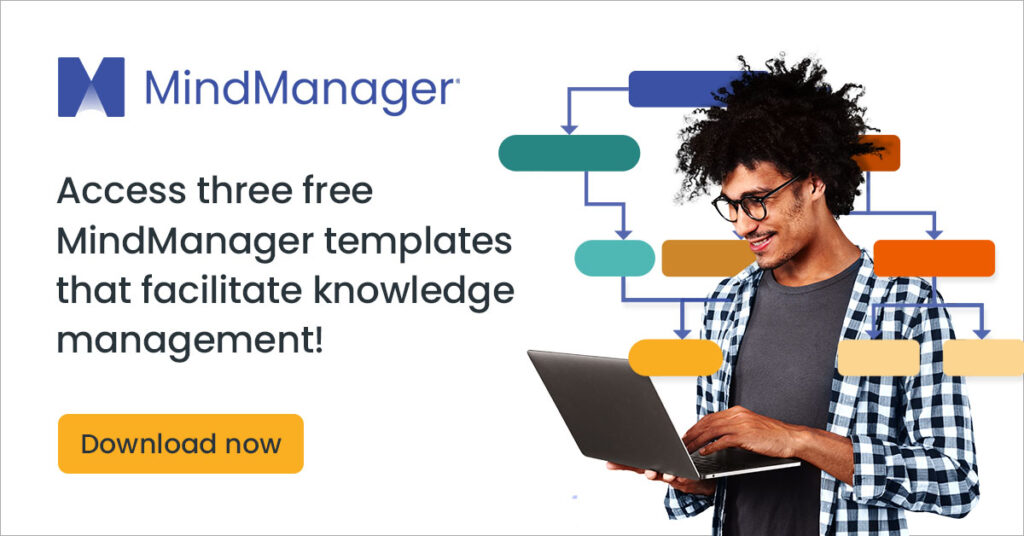Knowledge management is the three-step process of collecting, storing, and sharing data to become knowledge for an organization or group of people. Each of these three steps is highly important for successful knowledge management. Therefore, research or data collection plays a significant role in knowledge management. Data collection and storage enable participants to share the knowledge needed to succeed.
As the marketplace becomes increasingly competitive, data collection becomes even more vital to the success of a business. Organizations can stay ahead of the curve and their competitors by investing in proper data collection and knowledge management tools, such as MindManagerⓇ. MindManager offers users dozens of diagrams, maps, charts, and other visual and collaborative templates that can aid your organization in data collection and overall knowledge management.

Data collection vs. data visualization
Data collection and visualization are two separate processes that often go hand in hand. According to Simplilearn, data collection, by definition, is “the process of gathering and analyzing accurate data from various sources to find answers to research problems, trends, and probabilities to evaluate possible outcomes.”
Essentially, data collection is the act of gathering and measuring information so people can use it to solve problems and answer questions. For instance, requirements gathering is a common example of data collection that MindManager can assist; a requirements gathering checklist can then be visualized in the form of one of the charts or diagrams available in the software.
The definition of data visualization is using visual representations to communicate information. Data visualization can be done via graphs, charts, diagrams, etc., to make information easier to comprehend. While data collections and data visualization are different, they often are used in conjunction to create a successful knowledge management system. Furthermore, information may be lost or difficult to understand without one another.
Data collection methods
There are many ways in which businesses collect data. However, data collection can be separated into two central divisions:
Primary data: First-hand information collected by data researchers, which is often highly accurate but potentially time-consuming and expensive.
Secondary data: Second-hand information is often portrayed as quantitative data, which the researcher has tasked others to collect or look up. Secondary data is often cheaper to obtain than primary data but raises concerns regarding accuracy and authenticity.
The seven primary forms of data collection include:
- Surveys
- Social media monitoring
- Interviews and focus groups
- Observation
- Transactional tracking
- Online tracking
- Forms
While primary data collection methods are quite specific, secondary data collection methods vary. These include, but are not limited to:
- Sales reports
- Financial statements
- Personal contact information
- Business journals
- Government records
- Trade/business magazines
- The internet
Types of knowledge maps to use for data collection
When collecting primary and secondary data, software is a vital research tool to help retain company knowledge and information. MindManager makes it possible to create information, knowledge, navigation, or dashboard maps to improve data collection and sharing. Additionally, users can easily incorporate images, blocks of text or hyperlinks, and any web content into the mapping templates.
The three types of knowledge maps that people can use to collect and store data for a successful knowledge management system include:
Procedural knowledge maps: Effectively document and communicate procedures across an organization and break down standard functions, task-by-task. Procedural maps help companies streamline the knowledge transfer process when hiring new employees or handling incident reporting.
Conceptual knowledge maps: Feature a central idea or theme with branches of related issues, concerns, or ideas to show how multiple matters are related to the first issue using subtopics.
Competency knowledge maps: Illustrates behaviors to help a company identify the training needed to build necessary proficiencies. They can be a practical foundation for solving internal skills gaps and feeding talent into the right areas.
Challenges of data collection in knowledge management
Data collection isn’t always easy. For data collection and knowledge management to be effective and successful, you’ll have to overcome some common challenges. The three most significant barriers to data collection include the following:
1. The motivation of your employees
For data collection to work, employees must be motivated. Therefore, company leaders must communicate the importance of capturing essential company data. Furthermore, leaders should set expectations for employees and continuously evaluate whether they have met them.
Employee acceptance and motivation for data collection often hinge on the software and tools an organization chooses to adopt. The more intuitive, modern, and comprehensive their knowledge management tools are, the more likely employees will want to utilize them. Conversely, employee motivation will plummet if tools are outdated, slow, or time-consuming.
One way to motivate employees to use the data collection tools supplied by your organization is to encourage them by recognizing a job well done. For example, consider offering bonuses, rewards, or recognition to employees who successfully implement good data collection practices. This praise may motivate other employees to follow suit.
2. Outdated technology
Technology is continuously changing and evolving. The systems that worked well yesterday may be obsolete today. Outdated technology can hinder your organization’s ability to collect data and benefit from a knowledge management system.
If you notice that your employees are struggling to collect and store data, ask yourself these three questions:
- Is finding company information difficult or cumbersome?
- Is storing information proving to be more time-consuming than it should be?
- Are employees avoiding using the systems you’ve set to collect data?
If you’ve answered yes to any of these questions, your data collection technology may be outdated. Consider implementing something newer and fresher to help your employees succeed. Software, such as MindManager, can help you visualize your data, connect ideas and processes, and secure the safety of vital company information.
3. Information is difficult to find
Data and information are only useful if it’s easy to find. If employees can’t find the resources, expertise, or information they need, they aren’t benefiting from their knowledge management or data collection system. Effective data collection aims to give your organization an upper hand and competitive advantage rather than hindering you from achieving your business objectives.
Technology often makes or breaks your ability to collect data effectively and turn that data into company knowledge. If you feel that information is challenging to locate, consider upgrading your knowledge management system to help your employees and organization succeed.
The power of data collection and visualization for knowledge management
When data collection and visualization are successful, an organization can flourish. If employees don’t need to search for answers at work, productivity often increases. However, data collection and visualization are only effective when organizations use the proper knowledge management tools to ensure success.
Data visualization and data collection are incredibly powerful when executed correctly. Using templates like the ones provided by MindManager, you can simplify information and knowledge across employees and your company.

Using templates, shared information and valuable knowledge are presented in easy-to-understand ways that are modern, up-to-date, and available to you and your team at any time in a central location. As a result, this knowledge organization can improve understanding and communication within your organization.
Want to learn more about knowledge management? Check out our free e-book and free webinar today!
Try MindManager today to help you collect and visualize data to better knowledge management!

